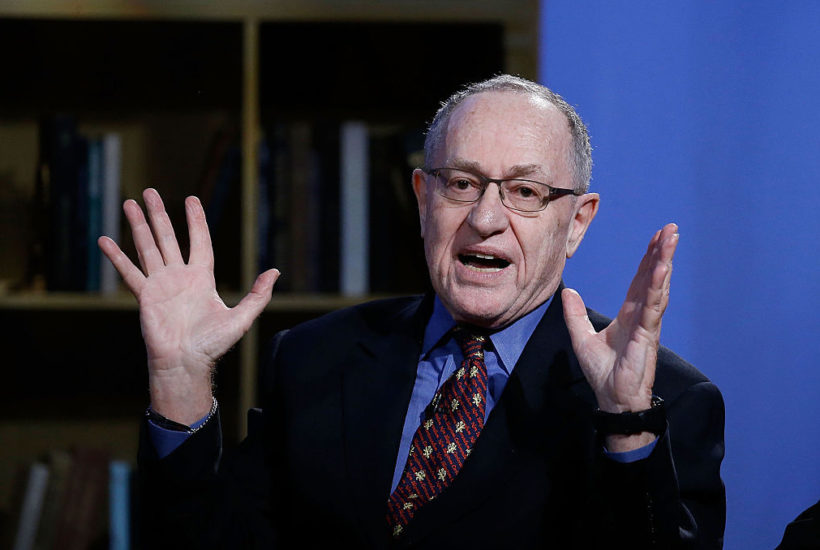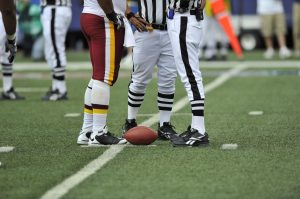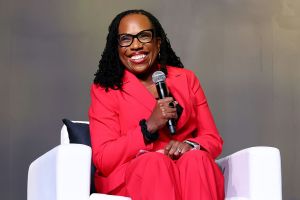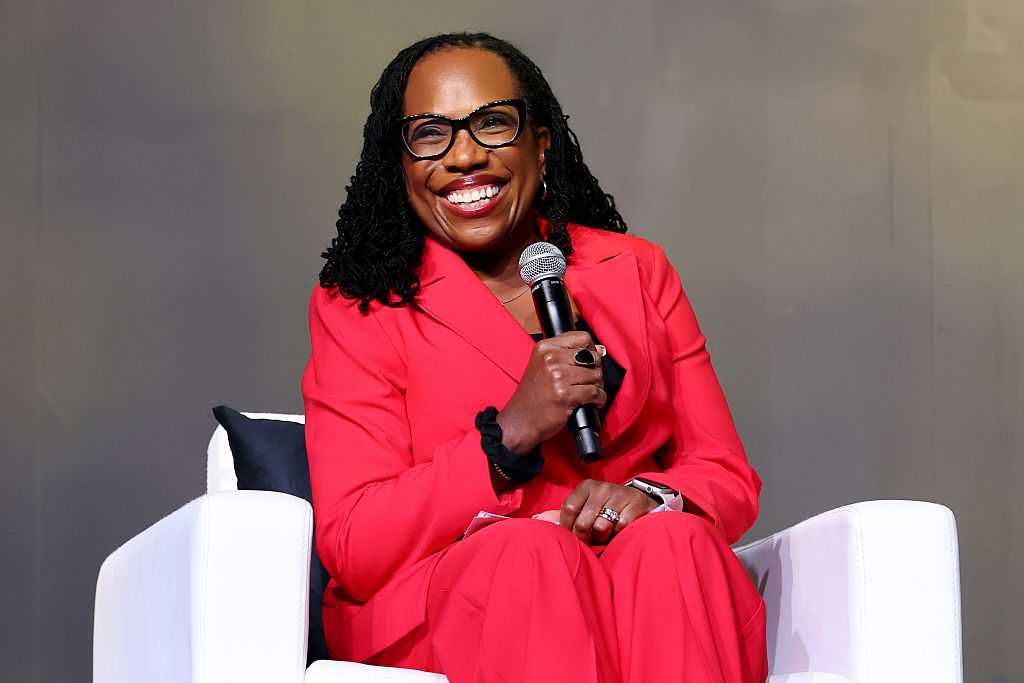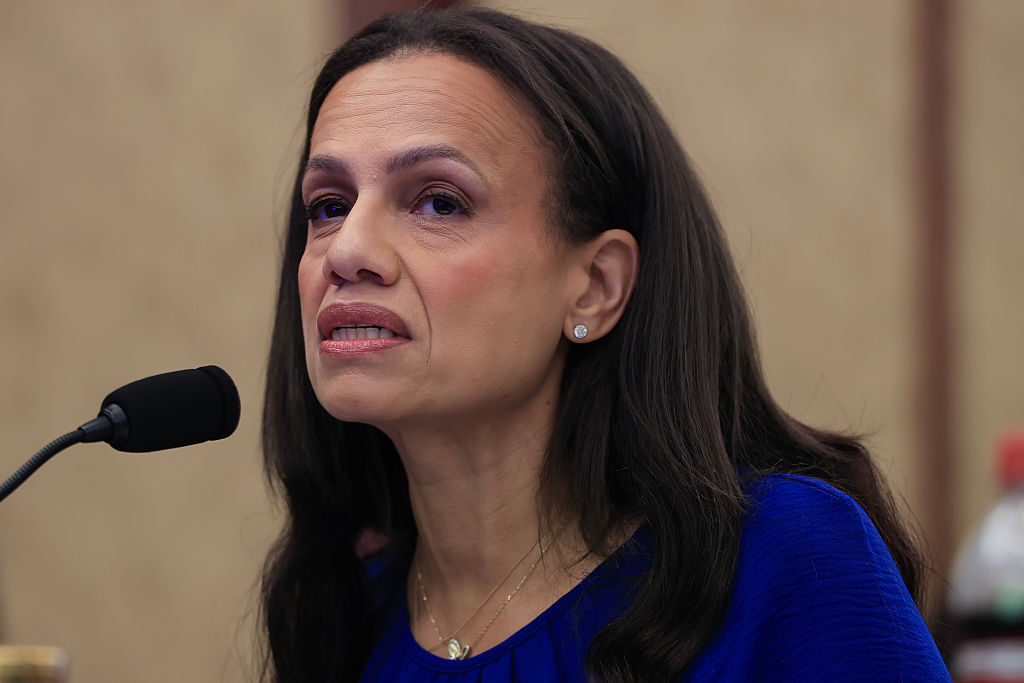The first day of impeachment hearings, and everyone has questions. I’m as confused as anyone else. So I phoned Alan Dershowitz, who’ll be testifying for President Trump’s team on the constitutional implications of impeachment, and cross-examined him on the case against Trump, the constitutional rights of the president, and whether he’d like to see Hunter Biden testify.
DG: Adam Schiff says that you’re not a constitutional lawyer, you’re a criminal lawyer.
AD: I’ve taught constitutional criminal procedure for nearly half a century. I’ve taught a seminar on impeachment, I’ve written three books on impeachment, I’ve written several other books on constitutional law and numerous articles. I’ve taught a course on constitutional litigation and I’ve litigated dozens of constitutional cases. They would not be making this argument about me if I were on their side. It’s totally ad hominem and selective.
DG: Would you defend any president against impeachment, or is it this particular case?
AD: No, no. I voted against this president. Not only would I defend any president who was impeached on unconstitutional grounds, I originally started writing my book, The Case Against Impeaching Trump, when Hillary Clinton looked like she was going to win the election. The original title of the book was The Case Against Impeaching Hillary Clinton. So this is not about Donald Trump. This is about impeachment.
DG: Did you support the impeachment of President Bill Clinton?
AD: I did not. I opposed it strongly. I testified against the impeachment of Clinton and I consulted with his legal team. I did support the impeachment of Richard Nixon, though I also supported defending his civil liberties at the time.
DG: The House managers of impeachment have called President Trump’s alleged conduct the ‘worst nightmare’ of the framers of the Constitution. Schiff quoted Alexander Hamilton in his opening remarks. What would the founders think of the Constitution being invoked in this way?
AD: I wrote an article for the Wall Street Journal entitled ‘Hamilton wouldn’t impeach Trump’. Hamilton said the ‘greatest danger’ would be an impeachment based on partisan votes, on who had the most votes in either House [and not on ‘real demonstrations of innocence or guilt’]. And that’s what we’re seeing. So Hamilton would be completely opposed to impeachment, as would Madison.
DG: Looking at the first charge, abuse of power. Is it possible for a president to conduct international diplomacy without using forms of leverage, negotiation and trade-off, or whatever a ‘quid pro quo’ might be?
AD: Quid pro quos are common in international relations. An example would be ‘Aid to Israel is conditional on stopping settlements’. That’s a position widely taken by some Democrats on the left. That’s quid pro quo. The real question is whether quid pro quo is used to one’s personal or political advantage. That’s proper. My view is that it’s not proper [in this case], but it’s not impeachable.
DG: As a lay person, my understanding is that the Congress authorizes elements of foreign policy, such as money or other forms sent as aid?
AD: Yes, but the president has ultimate authority over foreign policy. I’ll give you an example: if Congress were to authorize a billion dollars to go to Cuba, and the president said, ‘No, that’s not my foreign policy, I don’t support Cuba,’ the president would prevail under our Constitution and the money wouldn’t go to Cuba.
DG: Philip Bobbit disagrees with your interpretation. He’s also not a constitutional lawyer; he’s an expert on law and foreign policy.
AD: Well, he’s wrong. The Supreme Court has been very clear. I’ll give you an example: Congress wanted previous presidents to recognize Jerusalem [as Israel’s capital] and to allow [Americans] born in Jerusalem to write ‘Jerusalem, Israel’ [in their US passports]. The president said ‘no’, and the Supreme Court said ‘the president prevails.’ There are many cases.
DG: You’ve referred to President Obama sending money to Tehran as part of the Iran deal as one of them.
AD: Same thing. Congress would never have favored that. Congress would never have approved the deal. But he made the deal himself.
DG: Does the notion of a ‘quid pro quo’ have any basis in constitutional law?
AD: No, and that’s why it’s not in the impeachment articles.
DG: But ‘quid pro quo’ was a vehicle for getting to impeachment.
AD: But it’s not mentioned in the impeachment articles.
DG: What does that suggest about the strength of the case for impeachment?
AD: I think the case is extraordinarily weak under the Constitution. And I’ll make that argument despite all the critiques and personal attacks on me. I think it’s shocking that there have been so many personal attacks on me because of the position I’ve taken. If Hillary Clinton had been president, I’d have taken exactly the same position. With regard to her impeachment, people would be applauding me and saying I was a great expert on constitutional law. So it’s all partisan.
DG: Is it a matter of serious concern that a complaint from an anonymous whistleblower was one of the triggers of this process?
AD: I don’t think that’s a problem. The evidence has to stand on its own and be looked at carefully. If there were witnesses [called to testify], the witnesses should include the whistleblower.
DG: Again, speaking as a lay person, I’m confused where the line is between the national interest — for instance, what Hunter Biden did in Ukraine and who he did it for — and the personal interest of a president who expects to face Joe Biden in an election.
AD: You’re right to say that’s a hard line. Let’s go back to my Cuba example. Let’s say Congress allocated a billion dollars to Cuba and the president called his advisers in and said, ‘I need to know how sending the funds or not sending the funds will impact the voters in Florida and my re-election.’ That would be perfectly proper. Presidents are allowed to have mixed motives. And many presidents use foreign policy to their [domestic] political advantage. That’s why they have pollsters, that’s why they have advisers. So I think the line between personal, political and national is a very, very thin one.
DG: Adam Schiff says that the trustworthiness of the 2020 election is now hanging in the balance.
AD: He’s just dead wrong. There will be no cleaner election in American history than 2020, because everybody in the world is watching it. It’ll be the cleanest election in history, far cleaner than the 1960 election of John Kennedy, and probably cleaner than many other elections we’ve had since. It’ll be the cleanest election in American history precisely because everybody is watching.
DG: We’re all watching this process as well. Would you prefer the president to be vindicated by a vote or a dismissal?
AD: Dismissal.
DG: Why?
AD: Because I don’t think there’s an impeachable offense, and it would send a powerful message that you have to have an impeachable offense before you can proceed to try somebody. The same thing would be true if a person were charged criminally with dishonesty, and let’s assume that there were a long list of things he did which were dishonest. The judge would have to dismiss it, because there’s no such crime as dishonesty. Dishonesty’s a sin, but it’s not a crime.
DG: How long do you expect this to run for? Obviously the Democrats would prefer to prolong the agony.
AD: I don’t know. It depends on whether there are witnesses. If there are witnesses, it’ll go on for a long time, because there’ll have to be court determinations as to whether the witnesses can testify and whether there’ll be executive privilege.
DG: If you were a full-time member of Trump’s team, would you accept the ‘trade’ of witnesses that’s been rumored, trading John Bolton for Hunter Biden?
AD: I don’t know. I don’t know enough about the facts to comment about that. But I think that if Bolton does testify, then there’d be a strong case for bringing in Biden to testify.
DG: For both Bidens, Joe and Hunter?
AD: Certainly the son.
DG: Was the Senate right to reject proposals for witnesses and documents on Tuesday?
AD: I don’t think they’ve rejected them yet. They’ve just postponed them. I think there’ll be another vote after the arguments.
DG: Looking at the second charge against President Trump, the obstruction of Congress claim. If a president is prosecuted maliciously, is he permitted to defend himself [by instructing people not to co-operate with subpoenas]?
AD: Even if it’s not malicious, everybody has the right to defend themselves. The president has the right to demand a court proceeding before he allows members of the executive to respond to partisan subpoenas. I think he did the right thing.
DG: Looking at the long term, this is the third attempt at impeachment in 50 years. What does this say about the status of constitutional government in the US?
AD: I think impeachment has been promiscuously used since the Nixon impeachment. The only appropriate impeachment in American history was Nixon’s, which resulted in a resignation. None of the other three [Andrew Johnson, Bill Clinton, Donald Trump] was a legitimate use of impeachment.



